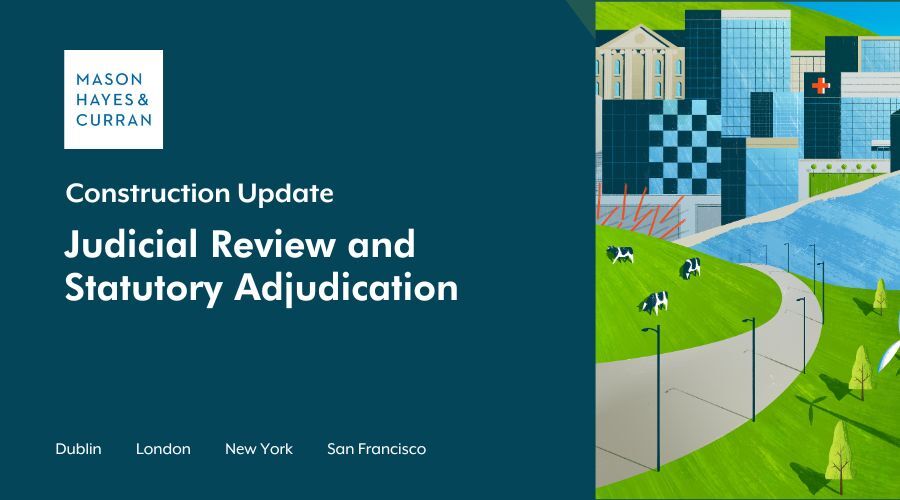
A recent High Court decision strengthens the Construction Contracts Act 2013, ensuring swift dispute resolution in the construction sector. By rejecting a challenge to an adjudicator’s jurisdiction, the ruling reinforces quicker payments and reduces legal delays. Our Construction, Infrastructure & Utilities team explores the decision.
A decision of the High Court in K&J Townmore Construction Limited v Damien Keogh[1]
will be welcome relief to many within the construction industry in Ireland.
A party sought leave to grant judicial review of a decision made by an adjudicator under the Construction Contracts Act 2013. The application was rejected. This rejection ensures that the Act will continue to serve as a useful tool for resolving disputes in the construction industry.
Townmore, the main contractor to Cobec, sought leave from the High Court to bring a judicial review to challenge the appointment of an adjudicator, Mr Keogh (the Adjudicator). The Adjudicator had considered that he had jurisdiction to adjudicate on a dispute between Townmore and Cobec under the Construction Contracts Act 2013. Mr Keogh declined an invitation to resign despite Townmore arguing that this was not a ‘payment dispute’ within section 6(1) of the Act.
Townmore stated that it would be inequitable to wait until the end of the adjudication proceedings before challenging the Adjudicator’s jurisdiction. They argued that the appropriate remedy is an order issued in advance of the adjudication. Cobec argued that leave to grant judicial review should not be granted as the Act provides an appropriate remedy through enforcement proceedings. In challenging this view, Townmore stated that the more appropriate remedy would be to decide the Adjudicator’s jurisdiction in advance before participating in an expensive and potentially wasteful adjudication.
The key question for the High Court was whether a challenge to the Adjudicator’s decision should take place before the adjudication is complete i.e. by means of a judicial review, or whether it should take place after the adjudication is complete i.e. through ‘enforcement proceedings’ envisaged by the Act.
Decision
The High Court rejected Townmore’s application.
Mr Justice Twomey citing Aakon Construction[2] and Beneavin Contractors[3], noted that the decision of an Adjudicator is binding but it is not enforceable until there has been a decision of the High Court to that effect, i.e. via enforcement proceedings as envisaged within section 6 of the Act. Therefore, he concluded that the appropriate forum to resolve this issue is at the enforcement proceedings stage.
Although not determinative in the decision, Mr Justice Twomey cited other factors for rejecting Townmore’s application:
- The underlying rationale for adjudication in the Act is to bring about speedy payment for builders. If leave for judicial review to challenge the whole process was granted, there would be a significant impact on the time it will take to resolve the dispute.
- The Oireachtas introduced the Act to reduce legal costs which are incurred by parties to a construction contract. Mr Justice Twomey noted that the advantage of adjudication would disappear if the High Court permitted a judicial review.
- The Oireachtas has already provided for enforcement proceedings for the Adjudicator’s decision to be enforced within the Act. Therefore, an adjudicator’s jurisdiction could be challenged at this stage.
- Opening the Act to challenge by way of judicial review would be inconsistent with the speedy dispute resolution mechanism contained in the Act. It would also incentivise parties to a construction contract to judicially review adjudications to delay payments for a year or more.
- The adjudication process may result in an outcome that is acceptable to both parties.
- The adjudicator should not be prevented from exercising their statutory functions. Instead, the challenge of an adjudicator’s decisions should be as envisaged by the Act.
- The procedure put in place by the Oireachtas to resolve these disputes is particularly suitable for building contract disputes.
Conclusion
The Construction Contracts Act 2013 has proven a useful tool for the resolution of payment disputes in construction projects in Ireland. The legislation is designed to reflect that cash flow is the central to the continued health of the construction sector.
As noted by Mr Justice Twomey, permitting a party to a construction contract to impose expensive and slow litigation, in the form of judicial review process, would run contrary to the intention of the Oireachtas. It would also permit employers and main contractors to withhold payments to building contractors.
For more information, contact a member of our Construction, Infrastructure & Utilities team.
People also ask
What is the Construction Contracts Act 2013? |
The Construction Contracts Act 2013 is the statutory instrument which applies to all “construction contracts” entered into after 25 July 2016. The Act provides a party to a construction contract the right to refer for adjudication any dispute relating to payment under the construction contract. The Construction Contracts Act 2013 ensures that payment disputes are resolved swiftly and avoids the high costs associated with High Court Litigation. |
What is Adjudication under the Construction Contracts Act 2013? |
The Construction Contracts 2013 provides parties to a construction contract the right to refer to a payment dispute to adjudication. Adjudication is an alternative dispute resolution mechanism which is designed to provide a decision on a payment dispute within 28 days of referral to adjudication. Adjudication is an efficient method for resolving payment disputes on construction disputes. |
What is the key takeaway by the Irish High Courts decision in Townmore v Keogh? |
Judicial review will not be granted for a party seeking to challenge an adjudicator’s decision in advance of the adjudicator reaching that decision. Instead, the appropriate mechanism to challenge an adjudicators decision is at the enforcement of proceedings stage as outlined at s.6 of the Construction Contracts Act 2013. |
[1] [2023] IEHC 509
[2] Aakon Construction v Pure Fitout Associated Limited [2021] IEHC 562
[3] Principal Construction Ltd v Beneavin Contractors Ltd [2021] IEHC 578
The content of this article is provided for information purposes only and does not constitute legal or other advice.
Share this:




